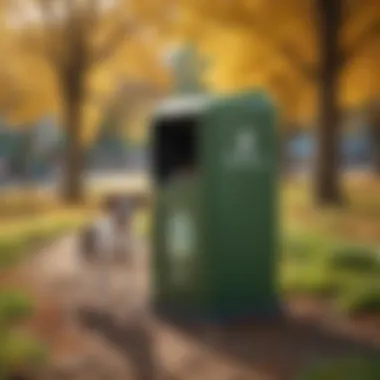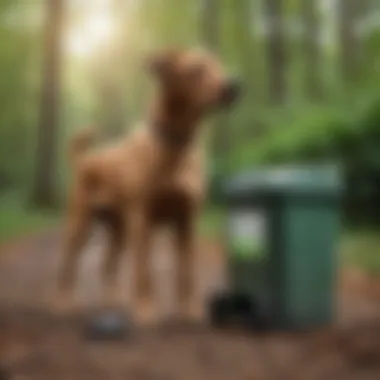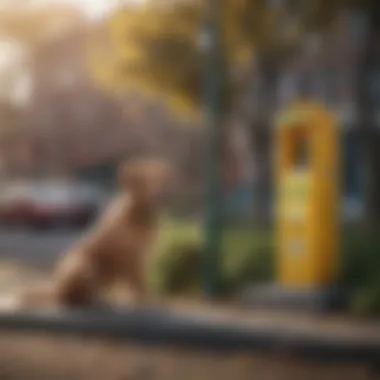Creative Solutions for Dog Waste Disposal


Intro
As pet ownership continues to grow, so too does the awareness regarding responsible management of pet waste. Dog owners recognize that cleaning up after their furry companions isn't just a chore; it's a critical part of maintaining a healthy environment. Many dog parks are littered with waste, showing a clear lack of attention to proper disposal methods. This lends itself to the need for innovative and effective solutions that cater to both the needs of the pet owner and the surrounding community. The aim of this article is to delve into various dog waste disposal options that reflect a commitment to responsible pet ownership while highlighting ecological considerations.
Being a responsible pet owner means understanding the impact of waste on our neighborhoods. Besides aesthetic concerns, dog waste can lead to health issues for both pets and humans if not dealt with properly. In the forthcoming sections, we'll explore different strategies—from the tried and true to the cutting-edge—to ensure that dog waste disposal becomes an act of environmental stewardship rather than an inconvenience.
Through this exploration, pet owners will find practical advice about integrating these disposal ideas into their daily routines. By doing so, we can pave the way for cleaner public spaces and healthier living conditions, all while enjoying the company of our furry friends.
Pet Care and Grooming
Importance of Regular Care
A crucial aspect of being a responsible pet owner involves maintaining the overall well-being of your dog. Regular care goes beyond just feeding and walking; it encompasses all aspects of health, including grooming, nutrition, and training. Establishing a routine for these activities ensures that your pet leads a healthy and happy life.
Grooming Techniques by Pet Type
Different breeds and types of dogs require various grooming techniques. For example, long-haired breeds like Golden Retrievers may need regular brushing to prevent matting, while short-haired breeds like Beagles might need less frequency but could benefit from occasional baths to eliminate odors.
Tools and Products Recommendations
Investing in the right tools can make all the difference in your dog's grooming experience. Here’s a quick primer on what you might need:
- Brushes and Combs: Regular brushing tools like slicker brushes for long hairs and rubber curry brushes for short hairs.
- Shampoos and Conditioners: Opt for gentle, pH-balanced products designed for canines to ensure skin health.
Seasonal Care Tips
With changing seasons, your dog's grooming needs shift as well. For instance, in summer, it’s essential to keep your pet cooler by trimming their fur, while in winter, a more extensive coat can help them retain warmth. Tailoring your care to the seasons can help ensure that your dog remains comfortable and content throughout the year.
Health and Nutrition
Understanding Pet Nutrition
In conjunction with effective waste disposal, recognizing the importance of balanced nutrition plays a significant role in dog health. A diet rich in high-quality proteins, fats, and carbohydrates can enhance not only their overall health but also their bowel movements and digestion, contributing to easier clean-up processes.
Common Health Issues by Species
Being aware of common dog ailments is fundamental to responsible ownership. For instance, digestive issues might result in irregular stools, prompting more urgent clean-up. Regular vet visits can help catch such issues early, ensuring both your pet's health and your community’s cleanliness.
Preventive Care and Regular Check-Ups
Regular vet visits coupled with vaccinations and preventive measures can save you and your dog from both health complications and the inconvenience of sudden waste management issues.
Food and Dietary Advice
Choosing the right food is essential not just for your pet’s well-being but also for ease of waste management. Sometimes, a change in diet can enhance digestion, leading to more consistent and easier clean-up.
Behavioral Training
Basics of Positive Reinforcement
Training your dog effectively impacts their behavior, and by employing positive reinforcement, owners foster a more obedient pet. A well-trained dog is less likely to create messes in undesirable places, simplifying waste management considerably.
Training Techniques Users Can Apply
Simple commands, when practiced regularly, can help solidify good habits in dogs. Techniques such as clicker training can help reinforce the desired behaviors effectively.
Managing Behavioral Issues
Understanding and addressing behavioral issues early on can prevent future complications, including waste accidents in the home or garden. Patience and consistency in training will pay dividends.
Importance of Socialization
Well-socialized dogs tend to behave better in various environments, making waste disposal less of an issue in public spaces. Regular interaction with other dogs and people can enhance your pet’s behavior.
Engaging Activities and Enrichment
Fun Games to Play with Your Pet
Incorporating engaging activities can provide mental stimulation, reducing behavioral issues that may lead to waste accidents. Games like fetch or hide-and-seek challenge dogs mentally and physically.
DIY Toys and Activities
Getting crafty with homemade toys can be a rewarding experience. Old t-shirts can be twisted into ropes for tug-of-war, reducing the cost of pet ownership while enhancing your dog's playtime.
Importance of Mental Stimulation
Just like humans, dogs need a variety of activities to keep their minds sharp. Puzzle toys and training exercises can help with this.
Outdoor Adventures and Exploration
Engaging in outdoor activities fosters a connection between you and your pet. There are countless opportunities to explore, whether it’s regular walks in the park, hiking, or simply playing in the backyard.
Resources and Community Engagement
Recommended Books and Websites


A treasure trove of information awaits in books dedicated to pet care and community forums. Websites like Wikipedia offer a broad array of knowledge.
Forums and Groups for Pet Owners
Connecting with other pet owners through platforms like Reddit or Facebook can provide invaluable support and knowledge-sharing opportunities regarding responsible waste disposal methods.
Finding Local Services and Classes
Look for local training classes or pet care services in your community. These can often provide insight into best practices for waste management.
Encouraging Community Sharing and Contributions
Creating a community dialogue around pet waste management can encourage more responsible behaviors. Share ideas, tips, and experiences to inspire others in your area.
The Importance of Responsible Dog Waste Disposal
In any community, the presence of dogs brings joy and companionship. However, with this joy comes the responsibility of proper waste disposal. Understanding the importance of responsible dog waste disposal is crucial not just for pet owners but for the environment, public health, and the enjoyment of shared spaces. The negative perception surrounding dog ownership often stems from inadequate waste management, leading to a need for pet owners to take their responsibilities more seriously.
Environmental Impact of Dog Waste
Dog waste isn't just a nuisance; it can significantly affect the environment. When left on sidewalks, parks, or in yards, it can contaminate soil and waterways. The bacteria and pathogens in feces can leach into storm drains and eventually end up in lakes and streams. This contamination can disrupt aquatic ecosystems, harming fish and other wildlife. Moreover, dog waste is high in nitrogen and phosphorus, which can cause harmful algal blooms in water bodies, leading to decreased oxygen levels and affecting the aquatic life.
"Every time a dog owner chooses not to pick up after their pet, they contribute to a larger problem that affects the community's health and the environment."
To combat this, responsible dog waste disposal involves utilizing proper methods to ensure that waste is safely removed and disposed of. This not only keeps our community cleaner but also preserves local wildlife habitats.
Health Risks Associated with Dog Waste
Neglecting dog waste can pose serious health risks to both humans and animals. Dog feces can carry parasites such as roundworms and Giardia that can lead to gastroenteritis in humans. Children are particularly susceptible, as they often play in parks and could unknowingly come into contact with contaminants. Additionally, stepping in dog waste can lead to increased instances of bacterial infections.
The simple act of picking up after one’s dog protects not only the community's aesthetics but also its health.
- Pathogen Exposure: Dog waste can harbor bacteria like E. coli, which can cause serious health issues.
- Allergens: Some people may develop allergic reactions to certain components found in dog feces.
- Environmental Hazards: When waste decays, it creates methane, a potent greenhouse gas.
Thus, responsible disposal methods not only maintain a clean environment but are integral to safeguarding public health, fostering a greater sense of community among dog owners, and enhancing the overall livability of the area.
Traditional Disposal Methods
Responsible pet ownership includes understanding the various dog waste disposal options available, particularly the well-worn traditional methods. While innovative solutions are on the rise, traditional methods should not be dismissed as they form the backbone of waste management practices for pet owners everywhere. Each method carries its own set of merits, potential pitfalls, and considerations. In a world that increasingly values environmental sustainability, it’s essential to circle back to these conventional strategies and evaluate their relevance today.
Plastic Bags: A Common Choice
When one thinks about dog waste disposal, plastic bags often come to mind first. They’re ubiquitous—found in stores, parks, and even given away by shelters. Their appeal lies in their convenience; a roll can easily fit into any bag and be ready when it’s time for a walk. Most pet owners have encountered the panic of realizing mid-walk that the dog has done its business with no way to clean it up. A plastic bag saves the day, allowing for prompt clean-up.
However, the environmental implications of using plastic bags are significant. Many individuals are unaware that these bags can take centuries to break down in landfills. Moreover, tossing them into recycling bins can often lead to them being sent to the regular trash due to contamination. Thus, while plastic bags offer immediate solutions, they also pose long-term environmental challenges that responsible pet owners must consider.
Some Points to Ponder About Plastic Bags:
- Convenient: Easy to carry and use during dog walks.
- Disposable: Quick solutions for messy situations.
- Environmental Concerns: Long decomposition times and the risk of pollution.
- Alternatives Available: Biodegradable bags can provide a more eco-friendly choice.
Shovels and Bins for Yard Clean-Up
A shovel and a dedicated bin can be a pet owner's best friend, especially for those with larger yards. Using a shovel provides a portable and effective means to collect waste without having to touch it directly. It also enables one to keep the yard clean and inviting for both pets and people.
Once collected, having a designated bin for dog waste holds many benefits. It prevents offensive odors and discourages pests. Additionally, a well-placed discreet bin can make managing pet waste far less burdensome. Keeping the yard clean contributes to not just the aesthetic but also health benefits, as dog waste can carry parasites or diseases that might affect both pets and humans.
Key Benefits of Using Shovels and Bins:
- Efficient Clean-Up: Collects waste quickly and hygienically.
- Organized Disposal: Keeps waste contained away from other areas of the yard.
- Health Benefits: Reduces the risk of disease transmission through proper waste management.
- Improvement in Aesthetics: Maintains a clean outdoor space.
As pet ownership continues to rise, the awareness of responsible waste disposal and its implications for health and environment must keep pace. Traditional methods, while being quite basic, provide an essential foundation upon which innovative ideas can build. All in all, understanding these methods can help pet owners make informed decisions that benefit their furry companions, themselves, and the broader community.
"An ounce of prevention is worth a pound of cure."
In summary, though often overlooked, traditional disposal methods remain relevant in the pursuit of responsible pet ownership. Balancing convenience with environmental stewardship is crucial for every dog owner. By considering methods like plastic bags and the trusty shovel, pet parents can navigate their clean-up responsibilities far more efficiently.
Innovative Waste Disposal Solutions
In the realm of responsible pet ownership, the adoption of innovative waste disposal solutions has emerged as a pivotal topic. Traditional methods of handling dog waste, while practical, often fall short in addressing the growing concerns of environmental sustainability and public health. Advances in technology and eco-friendly practices are reshaping this landscape, presenting pet owners with safer, cleaner, and more responsible options.
The shift toward innovative waste disposal solutions not only minimizes the adverse effects of dog waste but also encourages a collective approach to community cleanliness and animal care. By understanding the benefits of these modern approaches, we can foster a healthier relationship between pet owners and their surroundings.
Pet Waste Digesters
Pet waste digesters represent a novel approach to dog waste management. These systems function similarly to miniature septic tanks, quickly breaking down waste through natural processes. With the right conditions, including moisture, oxygen, and soil bacteria, these systems can transform dog waste into nutrient-rich compost that enriches the soil in your garden.
Considerations for using a pet waste digester include:
- Location: Ideally, place the digester in a sunny area, as warmth can help accelerate the decomposition process.
- Maintenance: Regularly add water and cover with soil to maintain the optimal environment for the breakdown of waste.
- Capacity: Select a digester that meets your household’s needs, as proper sizing ensures efficient processing.
The benefits of using these digesters are numerous: they reduce the odor associated with waste, eliminate the hassle of frequent clean-ups, and promote a sustainable way to repurpose dog waste. By adopting this method, pet owners not only do their part for the environment but also take pride in contributing to greener practices.
Composting: A Sustainable Alternative
Composting dog waste might seem unconventional, but it effectively reduces waste while nurturing plants. However, it is crucial to note that not all dog waste is suitable for composting, primarily due to the risk of pathogens. Therefore, it’s essential to implement a compost system specifically designed for pet waste.


To effectively compost dog waste, a few steps to follow:
- Dedicated Compost Bin: Use a separate bin, not to mix with food compost, to minimize health risks.
- Carbon-Rich Materials: Balance the compost with materials such as leaves, straw, or shredded paper to maintain the right carbon-to-nitrogen ratio.
- Proper Temperature: Ensure the compost reaches high temperatures, ideally above 140°F, to kill pathogens.
- Duration: Allow the compost to mature for six months to one year before using it in your garden, ensuring all harmful bacteria are neutralized.
Adopting composting can lead to several advantages:
- Waste Reduction: It significantly decreases the volume of waste sent to landfills.
- Soil Enrichment: Finished compost can be a valuable addition to your garden, enhancing soil health without synthetic fertilizers.
- Cost-Effectiveness: Over time, composting can save money on waste disposal and gardening supplies.
"Composting dog waste aligns with eco-friendly practices and fosters a community of responsible pet owners. It’s about transforming waste into a resource."
Innovative waste disposal solutions such as pet waste digesters and composting represent crucial steps toward responsible pet ownership. As we continue this journey, understanding and applying these methods can lead to cleaner environments and a more significant commitment to sustainability.
Technological Advances in Waste Management
In a world where technology continues to redefine almost every aspect of our lives, the domain of dog waste management is no exception. This section dives into how these advancements simplify, streamline, and enhance the process of disposing of dog waste. Embracing technology is crucial not only for efficiency but also for promoting responsible pet ownership. When pet owners utilize modern tools and systems, it benefits not just them, but also the community and the environment at large.
Automatic Waste Disposal Systems
Automatic waste disposal systems are transforming the way pet owners manage dog waste. These systems, resembling advanced litter boxes, operate on a self-cleaning mechanism. After a dog does its business, sensors detect the waste, and the system automatically scoops it up and stores it in a specialized container. This means pet owners don’t have to engage directly with the waste, eliminating unpleasant tasks from daily routines.
- Benefits:
- Hygiene Improvement: These systems help minimize the exposure to pathogens associated with dog waste.
- Convenience: They're especially handy for busy pet owners, reducing the time spent on clean-up.
- Containment: Waste is effectively contained, which can diminish unpleasant odors in the yard.
One well-received product in this category is the Pooch Power Scoop. This device uses a unique system to detect waste and is designed to operate quietly while keeping your garden clean. It also features an app to notify you when it's time to empty the bin.
The options and designs vary, but the principle remains: automation means less hassle.
Mobile Applications for Waste Tracking
On the digital frontier, mobile applications have also started to make waves in waste disposal practices. These apps help dog owners track and manage their pet's waste habits. By utilizing simple features, these applications can encourage better practices and promote awareness in clean-up efforts.
Here are some functionalities to consider:
- GPS Tracking: The app can remind users of local dog-friendly parks with waste disposal stations.
- Waste Log: Owners can log when and where their dogs defecate, creating awareness around the frequency and habits. This can lead to more responsible disposal, as they may see patterns and adjust their habits accordingly.
- Local Support: Some apps have platforms where users can engage with neighbors and discuss waste management in the area, promoting community awareness and cooperation.
An example of such an app is BarkTracker, which not only tracks dog waste but also offers a community board for local dog owners. This can be particularly beneficial in initiating cleaner public spaces.
Ultimately, this convergence of technology and waste management aids in fostering responsibility among pet owners. By making waste disposal easier and more organized, such systems and apps can help nurture a more respectful and cleaner environment for everyone.
Dogs and Public Spaces: Best Practices
Dogs are wonderful companions, but they also come with their own set of responsibilities, especially in public spaces. This section emphasizes the importance of practicing responsible dog waste management, underlining the collective effort required from every pet owner to keep shared areas clean and welcoming for all.
Community spaces, such as parks and sidewalks, are often frequented by both pets and people. When owners fail to manage their dog's waste appropriately, the consequences can be quite unpleasant. Not only does it affect the environment, but it can also lead to health issues and create a negative atmosphere for community interaction. This underlines the necessity for responsible pet ownership, particularly in shared spaces.
Community Initiatives for Cleaner Parks
Many neighborhoods have started implementing community initiatives designed to promote cleaner parks and public spaces. These programs often focus on several key strategies:
- Waste Stations: Installing dog waste stations equipped with bags and disposal bins encourages pet owners to clean up after their dogs. Locations should be easily accessible to motivate compliance.
- Volunteer Clean-Up Days: Organizing community clean-up events is a great way to bring residents together while enhancing the local environment. This not only cleans up waste but also fosters a sense of community pride.
- Designated Dog Areas: Establishing specific areas for dogs to play can keep the waste contained to certain locations. These areas often provide increased supervision and maintenance, ensuring cleanliness over time.
Some successful initiatives have even collaborated with local governments to secure funding for better waste management facilities. Communities are finding that a proactive approach can lead to significant improvements in public spaces.
"Communities that engage in pet waste management initiatives see an increase in park usage and enjoyment by all citizens."
Education Campaigns for Pet Owners
Education plays a vital role in ensuring that dog owners understand their responsibilities. Campaigns aimed at educating pet owners can take various forms:
- Informational Workshops: Local governments and animal welfare organizations can hold workshops that discuss the environmental impacts of dog waste, health risks associated with negligence, and ways to dispose of waste responsibly.
- Social Media Campaigns: Engaging with the community through social media can help spread awareness and keep the topic in the public eye. Fun and informative posts encourage responsible behavior.
- Signage in Parks: Placing signs in parks and recreation areas that detail the need for waste management can remind dog owners of their obligations. Creative and informative signage can clarify what is expected and encourage proper practices.
These educational efforts can have profound impacts on community behavior, motivating pet owners to adopt best practices and demonstrating that everyone has a role in maintaining the cleanliness and health of shared environments. By fostering a culture of responsibility among pet owners, public spaces can become more enjoyable for everyone.
Legal Obligations for Dog Waste Disposal
When it comes to responsible pet ownership, understanding legal obligations surrounding dog waste disposal is crucial. Many municipalities have implemented regulations designed to address the health and environmental risks associated with leaving dog waste unattended. These rules not only protect the local environment but also foster a sense of community responsibility among pet owners. Compliance not only keeps our neighborhoods clean; it also underscores the importance of being a mindful dog owner.
Local Ordinances and Regulations
Local ordinances typically dictate specific rules regarding dog waste disposal. These can vary significantly from one area to another. Some common regulations include:
- Leash Laws: Many places require dogs to be on a leash when in public spaces, which indirectly leads to better oversight of waste disposal. If the dog is leashed, it’s easier for the owner to clean up immediately after their pet.
- Mandatory Clean-Up: Numerous municipalities enforce laws that demand pet owners to clean up after their dogs in public places like parks and sidewalks. Failing to do so can lead to hefty fines.
- Waste Disposal Stations: Cities may install convenience stations equipped with bags and waste bins specifically for dog owners. Knowing these are available encourages responsible behaviors just like leaving recycling bin in public.
Additionally, some local governments have initiatives to educate residents about these laws to promote better compliance.
Consequences of Negligence
Neglecting these legal obligations can lead to serious repercussions, both for the community and the pet owner. Here are some of the consequences of failing to comply with local dog waste regulations:
- Fines and Penalties: Most areas impose fines for failing to pick up waste. These can range from minor fees to significant penalties, especially if violations are repetitive. Imagine getting hit with a fine just for not doing something as simple as picking up after your dog. It doesn't sit well with many.
- Public Health Issues: Uncollected waste is not only an eyesore but can also pose health risks. Dog waste can harbor parasites and bacteria that can affect both pets and humans. If there's a public health crisis in the community, negligent pet owners may be held accountable.
- Negative Community Perception: A failure to abide by these laws can lead to a negative perception of dog owners in general. It affects how people see the community as a whole, creating resentment between pet owners and non-pet owners.
In summary, the legal obligations for dog waste disposal are part of responsible pet ownership. Abiding by these regulations not only maintains cleaner communities but also enhances the reputation of pet owners in the eyes of their neighbors.
Dog Waste Collection Services


Dog waste collection services are becoming a key player in the conversation about responsible pet ownership. These services not only address the often unpleasant task of cleaning up after dogs but also contribute to creating cleaner neighborhoods and healthier environments. Owners often find themselves juggling busy schedules, making it easy to overlook pet waste clean up. Engaging a professional service can be a significant solution to this common dilemma.
Overview of Pet Waste Removal Services
Pet waste removal services have sprung up in a variety of forms, catering to the specific needs of dog owners. These services can range from basic yard cleanup to comprehensive waste management solutions that help keep homes and communal spaces clean.
- Scheduled Cleanups: Many businesses offer regular pick-up services, which is perfect for busy folks who want to keep their spaces tidy without lifting a finger.
- One-Time Services: If there’s a gathering or event, some services provide one-off clean-ups, ensuring the space is blemish-free.
- Specialized Equipment: Many providers use advanced methods and hygiene standards during pickups, which helps reduce the risk of spreading pathogens associated with dog waste.
This variety of options means that pet owners can choose a service that best fits their lifestyle and budget, improving overall dog ownership experience.
Cost-Effectiveness of Professional Services
When considering a pet waste removal service, cost-effectiveness frequently becomes a topic of interest. People might question whether paying for such service is worth the money spent. However, the benefits often outweigh the costs.
- Time Efficiency: Engaging a service saves significant time. Pet owners can devote their attention to what matters most, be it family, work, or leisure, rather than worrying about cleaning up after their pets.
- Health Safety: Hiring a professional can also potentially reduce health risks. Improperly managed dog waste can lead to the spread of parasites and diseases. A service takes away that burden, ensuring that waste is disposed of using the correct methods that comply with local regulations.
- Environmental Consideration: Some companies use eco-friendly disposal practices, contributing to sustainability efforts while alleviating the guilt that may come from using traditional plastic bags.
In the grand scheme of things, while there is an upfront cost linked to dog waste collection services, the overall advantages they provide can make them not just a luxury but a reasonable investment in responsible dog ownership.
"Investing in pet waste services contributes to a cleaner environment not just for our pets but for everyone who shares the space we live in."
Community Engagement and Awareness
Addressing dog waste disposal isn’t just a solo endeavor; it thrives on community involvement. It requires each pet owner to wear the badge of responsibility proudly. When a neighborhood pulls together in understanding the importance of proper waste management, it leads to healthier living spaces and fosters a sense of pride among residents. The interaction between community members can significantly drive behavioral changes regarding pet waste, turning it into an inspiring narrative of collective achievement.
A vibrant community with engaged voices can advocate for effective solutions, promoting awareness and encouraging local initiatives. Furthermore, when pet owners rally together, they can bring attention to resources, tools, and education about responsible pet ownership. The key benefits of community engagement include raising consciousness about the environmental impacts of dog waste, reducing health hazards, and cultivating a culture of cleanliness and respect for shared spaces.
Creating a Cleaner Community Together
The motto "It takes a village" resonates deeply when considering the cleanliness of public parks and neighborhoods. Every individual’s effort counts. Engaging neighborhood watch groups or pet clubs can be pivotal. For example, organizing local clean-up days specifically for dog waste can galvanize participation. These days can serve as community bonding exercises, coupled with posted educational materials about the benefits of responsible waste management.
Some communities have also started ‘adopt-a-spot’ programs, where dog owners can volunteer for certain areas, regularly maintaining cleanliness. Initiating conversations about waste disposal can be as simple as placing signage in parks, reinforcing the message that pet owners are accountable for the waste their dogs generate. In situations where dog owners lead by example, unspoken peer pressure can work wonders.
Incentives for Responsible Owners
Providing incentives can shift the mindset toward responsible pet ownership significantly. Imagine a local business partnering with the community for an initiative where pet owners receive discounts on pet products or services by participating in waste collection events. This not only encourages waste disposal practices but also stimulates local business.
Additionally, organizing competitions where neighborhoods compete for the title of "Cleanest Community" can further drive engagement. For instance, you might have awards for the best clean-up crew or recognize individuals for consistent efforts in keeping their surroundings clean. Such friendly competition fosters a spirit of cooperation and significantly raises awareness about the implications of neglecting dog waste disposal.
In the end, creating a culture of shared responsibility encourages everyone to regard dog waste management as a community priority, ensuring a brighter, cleaner future for all.
Challenges in Dog Waste Management
Addressing the contemporary issue of dog waste management is not merely about cleanliness; it encapsulates a range of challenges that resonate throughout urban habitats and suburban neighborhoods alike. For pet owners, the management of dog waste poses various hurdles that can deter them from adopting effective disposal methods. It’s imperative to understand these challenges, as they affect not only individual households but also community health, hygiene, and ecological systems. Being aware of the common pitfalls can pave the way to finding suitable solutions, ultimately enhancing the relationship between pets and their human companions.
Common Issues Faced by Pet Owners
In the realm of pet ownership, several common issues arise when it comes to managing dog waste. These challenges often stem from a blend of complacency, knowledge gaps, and sometimes sheer inconvenience. First off, many pet owners may not realize the extent of their responsibilities regarding waste disposal, leading to a lack of action. Another issue is the sheer physicality of the task—when faced with inclement weather or a busy schedule, collecting and disposing of waste can understandably fall by the wayside. Moreover, a noticeable lack of accessible disposal options in certain neighborhoods can make things more difficult.
A few prevalent problems include:
- Inconsistent collection: Owners may find themselves juggling their schedule with weather conditions, which leads to inconsistent waste pick-up.
- Lack of facilities: Not all communities provide sufficient waste bins or bags at public parks, leaving pet owners in a lurch.
- Social stigma: Some owners may feel embarrassed to pick up after their dogs in public settings, as if they are drawing attention to themselves instead of doing the responsible thing.
These issues stem from personal and community attitudes toward waste management. By acknowledging these factors, we open up the floor for dialogue and innovative practices that encourage responsible disposal.
Barriers to Effective Disposal
Delving into the barriers that inhibit effective dog waste disposal reveals a more intricate landscape. Many pet owners experience a bottleneck in their waste management approach due to either logistical issues or a lack of education. Some might encounter physical challenges, particularly elderly pet owners or those with disabilities, who find the task physically daunting.
Additionally, educational barriers exist; not everyone understands the environmental or health implications of neglecting waste disposal. Misconceptions abound. For instance, some might erroneously believe that leaving waste on the ground is harmless for the ecosystem—a notion which couldn't be further from the truth.
Several secondary barriers can emerge, such as:
- Financial constraints: Those who may need professional waste collection services might find the costs prohibitive.
- Cultural differences: Attitudes toward pet care and responsibility can vary significantly from one community to another, affecting collective action.
- Time limitations: Busy lifestyles make it hard for pet owners to dedicate time for regular waste disposal, creating a cycle of neglect.
The societal impact of dog waste is substantial, necessitating a concerted effort from all pet owners to engage in responsible waste management practices.
Ultimately, recognizing these challenges and barriers can serve as a springboard for developing innovative waste disposal solutions. With the right mindset and resources, overcoming these hurdles is both feasible and critical for promoting a cleaner environment for all.
Future Trends in Dog Waste Disposal
As we push further into an age driven by sustainability and smart living, the topic of future trends in dog waste disposal emerges as crucial. The growing consciousness surrounding environmental issues accentuates the responsibility of pet owners. Trends within this domain are not just about embracing technology, but also about nurturing a more eco-friendly lifestyle. This section sheds light on what the future holds, how new innovations can change practices, and why it is vital for dog owners to adapt to these shifts.
Emerging Technologies in Waste Disposal
One cannot understate the significance of integrating technology into dog waste disposal. Traditional methods, while ubiquitous, often lack efficiency and ecological consideration. Enter solutions such as waste shredders and automatic disposal devices that can significantly minimize environmental footprints.
- Smart dog waste bins, which utilize sensors to alert owners when they are full, minimize overflow and help track disposal habits.
- Waste shredders, which convert dog waste into a more manageable form, can transform disposal into a hassle-free process. In the long run, this approach could lessen landfill contributions considerably.
- Biodegradable waste bags made from plant-based materials are another promising development, replacing standard plastic options that typically take centuries to decompose.
Investing in such technologies not only simplifies routine chores for pet owners but also fosters a community mindset focused on sustainability and collective responsibility. The merging of waste disposal and technology leads to a smarter, cleaner future that everyone can be a part of.
Predictions for Sustainable Practices
Looking ahead, it’s clear that the future of dog waste disposal will lean heavily on sustainable practices. Predictions suggest an increase in community-based initiatives to encourage eco-friendly disposal methods among pet owners. Think about it: local programs might offer incentives for using biodegradable options or for participating in neighborhood cleaning drives.
Some anticipated developments include:
- Community composting programs: Neighborhoods may establish shared composting sites where dog waste can be converted into fuel or fertilizers.
- Education campaigns: Increased focus on educating pet owners about the benefits of eco-friendly methods, turning awareness into action.
- Advanced mobile apps: Applications may emerge that not only track dog waste but also provide tips and even rewards for responsible practices.
"Transitioning to sustainable dog waste practices is not just an individual obligation; it's a collective responsibility that lights the path for coming generations."
With dog ownership rising globally, aligning practices with sustainability is no longer a choice; it’s a necessity. By being proactive and adapting to future trends, we can ensure a cleaner, greener world for both pets and humans alike.















